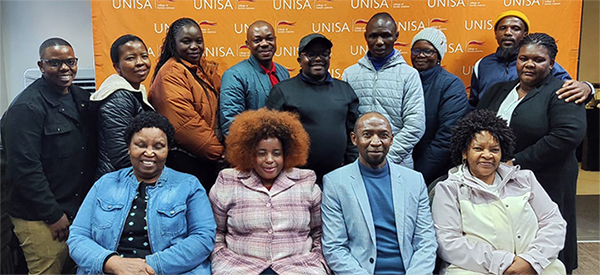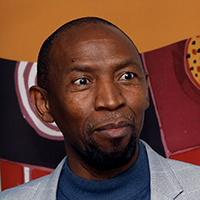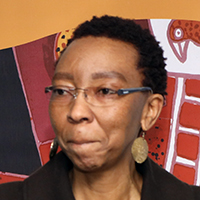College of Human Sciences
Where have all the riddles gone?
The Digitisation of the Multilingual African Riddles Project (DMARP) is conducted under the auspices of the Department of African Languages and is funded by the College of Human Sciences. From 2 to 4 July 2024, the Department of African Languages’ Dr Matsie Mokuoane led a workshop to map the way forward for DMARP.

Standing: Zinhle Mshengu, Dr Yolisa Madolo, Dr Violet Pule, Mothusi Moswele, William Jiyana, Justice Mdhluli, Dr Cordelia Nkwinika, Jabulani Sibanyoni and Dr Mercy Mahwasana
Seated: Dr Seleka Tembane, Thilivhali Mukosi, Prof Stanley Madonsela and Matseliso Kulo.
The workshop was opened by the Chair of Department of African Languages, Prof Stanley Madonsela, who emphasised that the project is central to the advancement of African languages in the digital space as it promotes engaged scholarship and outreach through its fundamental objectives while resonating with the catalytic niche areas that Unisa has identified.

Prof Stanley Madonsela, Chair of the Department of African Languages
Madonsela further indicated that this project seeks to facilitate a more active and engaged democracy by bringing together academics, researchers and affected communities in the African languages arena in ways that advance the research and development of our languages in the digital space with, and not merely for, the public.
DMARP is a collaborative research project that stems from Mokuoane’s 2023 doctoral study titled Sesotho Riddles in the Fourth Industrial Revolution: Dynamism, Development and Digitisation. This project brings together experts and researchers from Unisa, Walter Sisulu University, Sol Plaatje University, the University of Mpumalanga and the Reformed Church. The research will focus on Sesotho, Sesotho sa Leboa, Setswana, Siswati, isiNdebele, isiXhosa, isiZulu, Tshivenda and Xitsonga. The researchers hope to expand the footprint of this project to Lesotho, Botswana, Eswatini, Zambia and Zimbabwe by collecting as many riddles as possible in the dialects of the languages mentioned above.
Mokuoane’s study highlights the fact that riddles are no longer a popular form of entertainment because the broadcasting media, including tablets and smartphones, offer a more convenient and instant preoccupation for youngsters and adults alike. This means that the educational worth of riddles is being devalued, which could lead to the loss of indigenous knowledge, vocabulary, and learning to work in a team, and widen the ever-increasing generational divide.

Dr Matsie Mokuoane, lecturer in the Department of African Languages
Mokuoane's study reveals that there is a tug of war concerning riddles in that, firstly, the teaching of riddles is delegated to the schools – the parents have relinquished this important duty to the teachers. She is of the view that it is the family’s responsibility to teach children riddles as it helps them to learn their mother tongue and vocabulary, embrace unity by learning to work in pairs or teams, and observe their immediate environment. It also fosters generational closeness.
The second tug of war is between men and women. Riddling and storytelling are often associated with females – the grandmother, the aunts and the mother. In current times, both men and women ought to be teaching children riddles and all that concerns culture. It is not only a woman’s job.
The last tug of war is between Basotho structures (such as the family, traditional chiefs, Sesotho advocacy groups) and organs of state that have been established to create a conducive learning environment for culture, but somehow fall short. This research will delve deeper into this perceived challenge, escalating to the issue that these organs of state are not creating a learning environment or offering visibility in terms of oral literature for the African child in South Africa.
This begs the question, how then will African children in South Africa know of their oral literature and culture, and be confident in their identity? This research aims to bring this important genre of oral literature to the digital space for the sake of the current and future African child.
* By Dr Matsie Mokuoane, Lecturer: African Languages, College of Human Sciences
Publish date: 2024/08/19

 Unisa co-hosts G20 community outreach in the Eastern Cape
Unisa co-hosts G20 community outreach in the Eastern Cape
 Unisans gain membership of prestigious science academies
Unisans gain membership of prestigious science academies
 Advocating for disability transformation through servant leadership
Advocating for disability transformation through servant leadership
 Unisa Press continues to illuminate the publishing space
Unisa Press continues to illuminate the publishing space